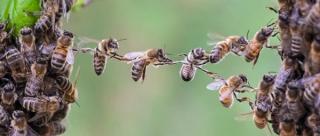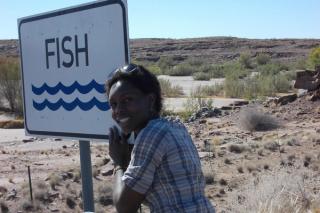
Strengthening Supplier Engagement: 5 ways companies can facilitate their suppliers’ transition to enhanced ESG performance
by Chynna Pickens
View post

Ada Lovelace Day – celebrated on the 12th of October - is an international celebration of the achievements of women in science, technology, engineering, and maths (STEM). It aims to increase the profile of women in STEM and, in doing so, create new role models who will encourage more girls into STEM careers and support women already working in STEM.
Fittingly, we’ve interviewed a few of the exceptional women at SLR to understand more about their roles, their journey, and to share some inspiration for younger generations. Today, we’re introducing Ester Gustavo, who is a Hydrogeologist based in Windhoek, Namibia.
Tell me a bit about your job?
My job as a hydrogeologist is multifaceted, but it principally involves groundwater. From groundwater level monitoring, groundwater quality monitoring, to water supply investigations, to permitting and site work comprising sampling, hydrocensus, supervision of drilling, and test pumping of boreholes.
Is there a typical day in your role? What does it involve?
There are two distinctly different ‘typical’ days in my role:
Being in the office entails desk work for a ground investigation project, reporting, or submitting permit applications for clients.
On the other hand, fieldwork involves waking up in a tent, getting breakfast, and then supervising drilling of boreholes, logging geology encountered in the borehole, and designing the installation of casing for successful boreholes, followed by making food on the fire.
Those are quite a contrast! When did you first become interested in hydrogeology? What influenced your decision to pursue it as a career?
My first interest in hydrogeology was sparked in my 4th year of my BSc Geology and Environmental Biology undergrad degree. We had a module called Hydrogeology 1 and 2, and I loved how I grasped the concepts so well and they actually made sense.
Also, a gentleman from the Division of Hydrogeology in the Department of Water Affairs came for one of the talks hosted by the department and he said, “people will always need water” and in my heart I responded, “say no more”.
This is where I belong, and I have pursued it ever since.
What an inspiring moment for you. What did you know about hydrogeology as a child?
That it was for men, and very smart men at that. And if you were a female in these fields, you lived overseas.
Clearly you’ve proved that misconception wrong! Did you ever experience any uncertainty this was the path for you?
Yes I did, especially when the country started experiencing a down turn in the economy and work was scarce, which meant I wasn’t being stretched or challenged, motivation was low, and encouragement was absent. There was a time of self-doubt, but when project work picked up again, and I had an unending to do list, the motivation picked up and confidence rose again.
What have you learned on the job that you couldn’t have learned in a classroom?
I have learned there are some things I can’t figure out because I don’t have the experience yet, as that kind experience is built over years. So, it’s okay to not know everything, and it doesn’t make me incompetent, just less experienced.
That’s a good philosophy. What has your experience been as a woman working in STEM? Have you faced any challenges?
I enjoyed the first 10 years of work, because I was single, and had no other obligations. So, I could be out in the field two weeks at a time and return to the field on a moment’s notice.
The challenge now as a wife and mother is that I can’t partake in field work for extended periods of time, and consequently billable hours don’t come by so easily anymore. The job description basically changes with life’s milestones.
Additionally, field work always came with a safety concern, as 90% of it was drilling and test pumping supervision in very remote areas. Not only was the ratio usually 1: 6, female to males, which can serve both as a threat or security, I was in the gramadoelas (remote wilderness), with elephants, cheetahs, snakes, floods, veld fires, heat, cold, and limited cell phone coverage, never mind lack of running water.
What advice would you give to girls interested in a career in hydrogeology?
You have to be okay with being in the field on a regular basis, you will miss a lot of social gatherings, and you may not get your nails and hair done as often as your accountant friends… But if you hang on, you will be one of the most important people in the country, because “people will always need water”.
In your opinion, what can the industry do to create a more positive environment that encourages more women to pursue STEM careers?
The industry needs to educate on unconscious bias. On several occasions, we would arrive at a client’s site with my male counterpart, and the client immediately assumes he is the project lead.
Equally, industries need to educate employers that the life cycle of a female in STEM is often different from that of a male. Of course, it doesn’t apply to all women, and everyone makes different choices, but for women who start a family, employers need to celebrate the fact that you are a mother; it’s an achievement and not a problem. Women should never feel they are becoming a liability.
-------------------------------------------------------------------------------
Read the rest of our Women in STEM series for Ada Lovelace Day:
Ghadeer Allaho - Project Geologist
Kimberley Tasker - Senior Ecologist
Leslie Cook Wong - Sustainable Consulting Leader
Lesa Delaere - Water Resources Advisor
And to learn more about Ada Lovelace Day, visit findingada.com